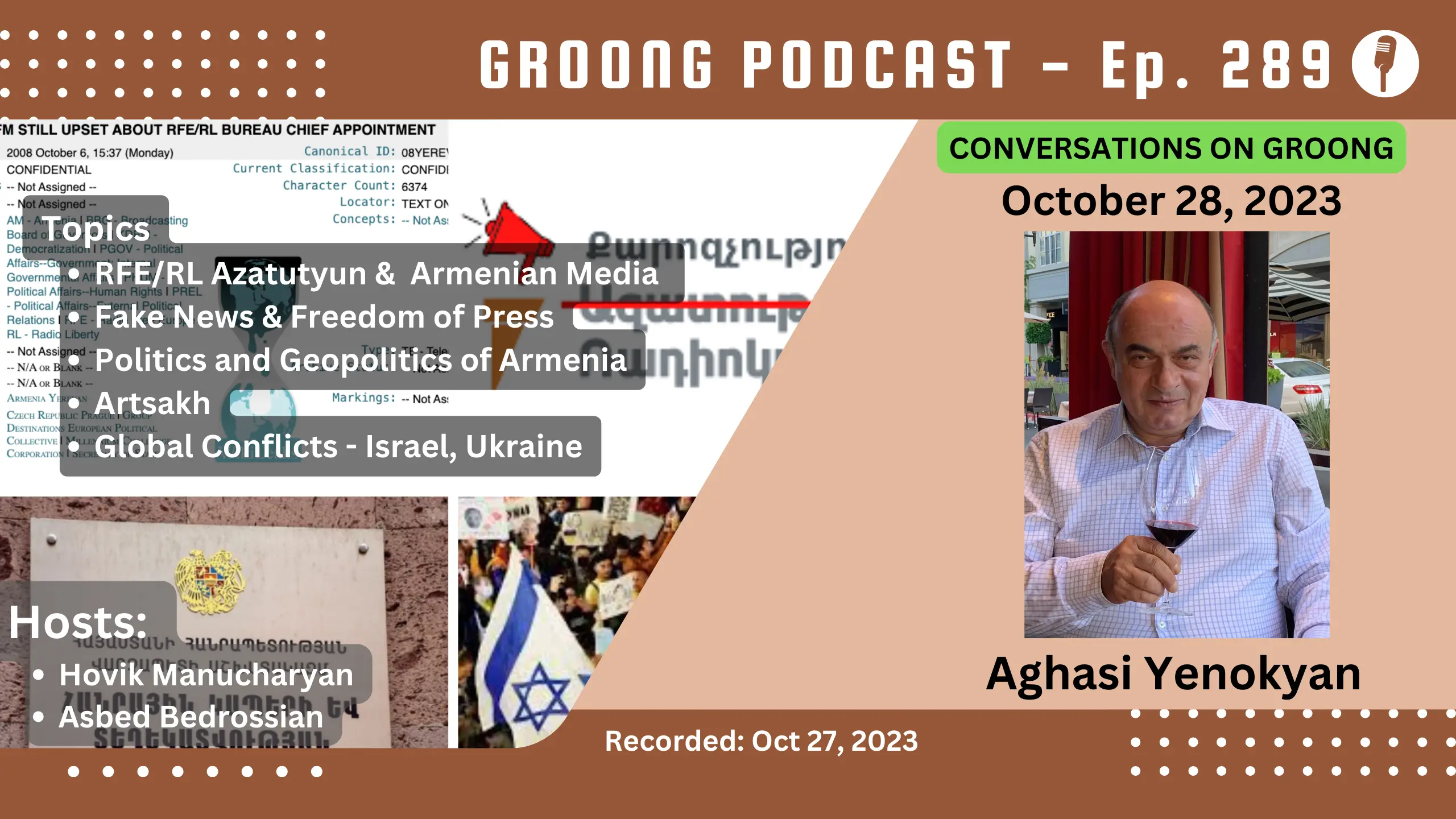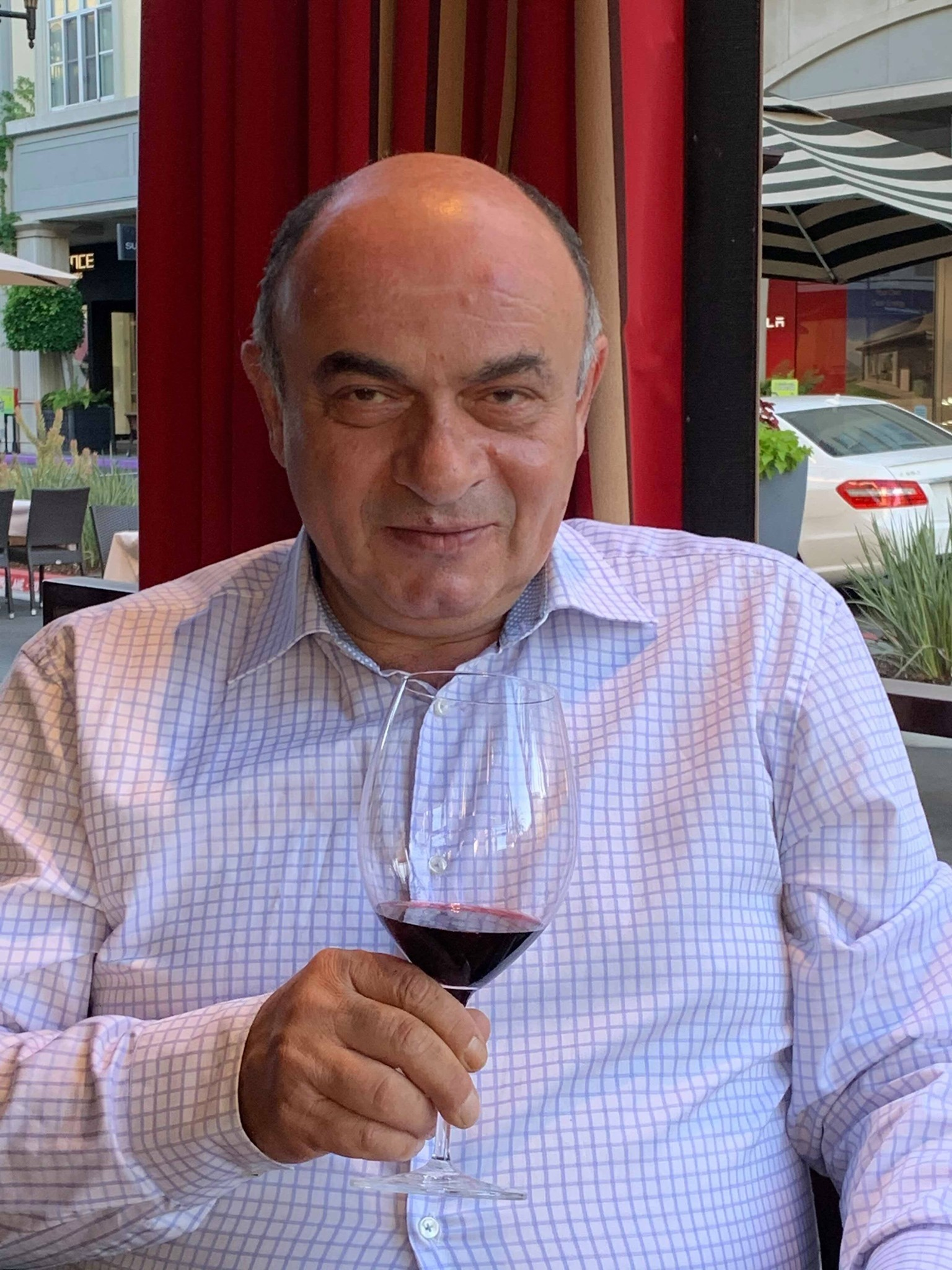Aghasi Yenokyan - Armenian News & Media | Azatutyun | Fake News | Press Freedom | Armenia | Artsakh | Global Conflicts | Ep 289 - Oct 28, 2023 [EP289]
Posted on Saturday, Oct 28, 2023 | Category: Armenia, Artsakh, Armenian Media, Israel | Series: cog
Guest:
Topics:
- Armenian News & Media Space
- RFE/RL Azatutyun in the Armenian Media Space
- Fake News
- Freedom of Press
- Politics and Geopolitics of Armenia
- Artsakh
- Global Conflicts - Israel, Ukraine
Episode 289 | Recorded: October 26, 2023
Show Notes
Armenian News & Media
RFE/RL Azatutyun Radio
Mr. Yenokyan, you were the head of RFE/RL in Yerevan from 2008 to 2013. During those years, you saw a period of significant political and social transformation. For the first time, you had a generation of adults that was born in an independent Armenia. It was also a time of relative prosperity (compared to the dark and cold days of the 1990s. We also saw a transfer of power between Kocharyan and Sargsyan as well as the events of March 1, 2008.
At present, Azatutyun is the second most popular news and media outlet in the Armenian news space. While it’s not officially part of the US government, it is funded by it and it’s essentially the Voice of America.
Questions:
- Can you describe its role in the Armenian information space?
- We know that president Sargsyan’s administration did not love your appointment as the bureau chief, why was that, and how was your relationship with the government of Armenia, during your tenure?
Media Independence
The USAID has from time to time allocated significant sums for the “support of Armenian Media”. A recent allocation in 2023 was for $17.5 million. That was basically the size of the entire advertising revenue for the industry back in 2016. NOTE: Based on your own past analysis, in 2016, the entire advertising market size for the first 5 months was about USD 8.3M (so roughly $20M for one year).
Questions:
- How are such sums allocated or spent in support of Armenian media? Where does the money go?
- How has the Armenian media market size changed over the past 7 years?
- Do such funding allocations truly hit their target? Is Armenian news & media measurably better after such allocations?
- Do such allocations manipulate the media? How?
At a first glance some tendencies, such as predominantly foreign funded media, have not changed. We have Azatutyun, Factor TV, Civilnet, and others who enjoy a more stable source of cash than locally funded media.
But here’s a real life situation: Foreign funded journalists get a much higher salary. They also get to travel to foreign countries for work and other benefits. Thus, they are much more incentivized to represent the viewpoints of their sponsors better than lowered cal journalists.
Questions:
- What effect does this disparity of funding between foreign and local media have on media independence and quality in Armenia, both perceived and actual?
- How would you assess the state of the media in Armenia today?
- Since you currently live in the US, have you had a chance to compare media independence in the US with Armenia?
Fake News in Armenia
Nowadays, Armenia has a relatively new phenomenon to deal with. Overtly fake news, without any attempt to hide behind a legitimate news company.
You have spoken about fake news in the past. But in the past few years it’s gotten infinitely worse, and with the technology that is coming online, the world we’re leaving to our next generation is likely to be an order of magnitude more confusing.
Questions:
- What are your thoughts on low-quality outlets like Perfect TV and a throng of mostly fake news media sites bombarding the Armenian public?
- What purpose are they serving?
- How are they funded, and by whom?
Freedom of Press
There are constant government attempts on freedom of press and journalism in Armenia. Sometimes there are bills in the parliament, sometimes they become law, or they cause a lot of consternation and then go away. The most notorious example is probably when the Pashinyan government criminalized “insults”, and then decriminalized it again. Yet, Armenia’s international media freedom rankings didn’t suffer much. At the same time, Pashinyan has said in the past:
_“I want to emphasize once again that in the history of the Third Republic, the press has never been freer than today”._
Questions:
- How would you assess the current state of press freedom in Armenia? Is Pashinyan’s statement correct?
- How would you describe the attitude of the Pashinyan government towards the media?
- Do you believe that various “freedom” indices, such as ones put out by Freedom House, are primarily guided by legitimate interests and therefore portray an accurate picture of the reality, or are they gamed and manipulated based on geopolitical interests?
Armenia
2018 Regime Change
We’re all aware of the changes that Pashinyan brought to Armenia in 2018.
Question:
- Were you supportive of the so-called “velvet revolution”, and what were your expectations?
Democracy
In 2018 you had predicted that Pashinyan first had to address a large number of domestic issues, and after that he would initiate a change in foreign policy direction:
Questions:
- In some ways, you were right. But have the changes proceeded according to your expectations?
- Do we have a democratic state today?
- How is it that Pashinyan still remains at the head of the government after multiple horrible war losses and foreign policy failures?
- Do you expect any changes in government in Armenia any time soon?
- Is democracy even possible in a region where the major players are autocracies or dictatorships?
- What are your thoughts about the level of sophistication and media literacy of the Armenian public?
Artsakh
We’re all aware of the loss of Artsakh last month, and the dispossession of the people of Artsakh from their homeland of millenia. Over 101,000 people were forcibly evicted in two week’s time at the end of September 2023.
Given the current situation in Armenia with the leadership of Artsakh, for example president Samvel Shahramanyan, speaker of parliament Davit Ishkanyan and others, and over 100 thousand refugees in difficult conditions:
Questions:
- What are the best next steps for the Artsakh leadership?
- Should they seek their right of return? Compensation?
- Why doesn’t Pashinyan meet with them to figure out next steps together?
Global Conflicts - Israel, Ukraine
Earlier this month a very significant crisis flared up in Israel, thousands are dead and injured without an end in sight at present. A greater and more immediate conflict is still playing out in Ukraine, which is a battleground for a war between Russia and NATO.
Importantly, both of these conflicts have repercussions all the way back to the South Caucasus and Armenia.
Questions:
- What dangers and opportunities do you see for Armenia in these crises?
- How should Armenia navigate through them?
- What tools do we have in FP that we are not using?
Wrap-up
All right, that’s our show, we hope you found it useful. Please find us on Social Media and follow us everywhere you get your Armenian news, the links are in the show notes. Thanks to Laura Osborn for the music on our podcasts. We’ll talk to you soon!
Guests

Aghasi Yenokyan
Aghasi Yenokyan is the former director of the Radio Free Europe, Radio Liberty (RFE/RL) Azatutyun office in Yerevan. He is a research fellow at Columbia University in Post-Soviet Studies, and a former lecturer at Yerevan State University. He has studied political theories at the University of Chicago, public policy at Arizona State University. He is a graduate from Yerevan State University’s Physics Department, and has also earned an MBA from the American University of Armenia.
Hosts

Asbed Bedrossian
Asbed is founder of the Armenian News Network Groong and co-founder of the ANN/Groong podcast.

Hovik Manucharyan
Hovik Manucharyan is an information security engineer who moved from Seattle to Armenia in 2022. He co-founded the ANN/Groong podcast in 2020 and has been a contributor to Groong News since the late 1990s.
Disclaimer: The views expressed by Hovik Manucharyan on the ANN/Groong podcast are his own and do not necessarily reflect the opinions of his employer or any other organization.